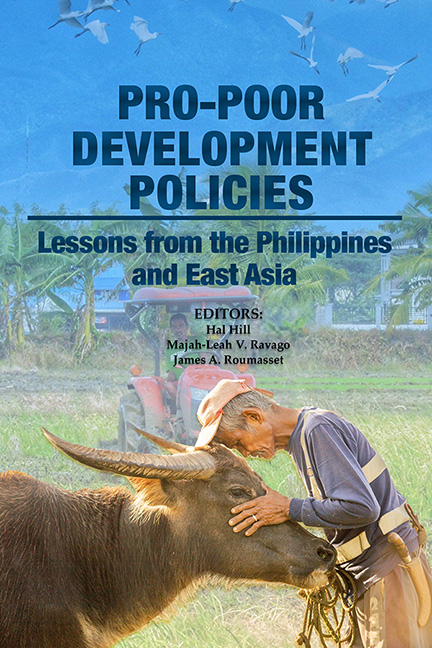Book contents
- Frontmatter
- Dedication
- Contents
- Figures, Tables and Boxes
- Foreword
- Foreword
- Message
- Preface and Acknowledgements
- About the Editors
- About the Contributors
- Acronyms
- Part 1 Introduction and Synthesis
- Part 2 Agricultural and Economic Development
- Part 3 Economic Policies for Achieving Targeted Levels of Living in the Philippines
- Part 4 Inequality and Economic Development
- Part 5 Competition Law and Policy
- Part 6 International Dimensions
- Index
17 - Redistributive Preferences and Prospects for Intergenerational Mobility in Southeast Asia
Published online by Cambridge University Press: 09 January 2024
- Frontmatter
- Dedication
- Contents
- Figures, Tables and Boxes
- Foreword
- Foreword
- Message
- Preface and Acknowledgements
- About the Editors
- About the Contributors
- Acronyms
- Part 1 Introduction and Synthesis
- Part 2 Agricultural and Economic Development
- Part 3 Economic Policies for Achieving Targeted Levels of Living in the Philippines
- Part 4 Inequality and Economic Development
- Part 5 Competition Law and Policy
- Part 6 International Dimensions
- Index
Summary
INTRODUCTION
Does the expectation of upward mobility influence an individual’s preference for government redistribution? We investigate the relevance of the prospects of upward mobility (POUM) hypothesis in the context of eight Southeast Asian countries to explain individual attitudes towards redistribution. As originally expounded in Benabou and Ok (2001), the POUM hypothesis suggests that when people expect redistributive policies not to change for some time, those with income below the mean but who anticipate better fortunes may not support such policies. The reason is that the upwardly mobile people, though currently poor, foresee themselves subjected to progressive taxes that would be difficult to amend. Such attitudes towards government redistribution may be reinforced by insights from older family members whose own efforts proved more important than exogenous factors (such as government aid) in their social advancements (Picketty 1995). Contrary to the median voter theorem that relates redistributive preferences to current income status (Meltzer and Richard 1983), the POUM hypothesis relates them instead to future income status, thereby explaining why a redistributive policy may not be supported by some of its intended beneficiaries (Alesina and La Ferrara 2005).
The POUM hypothesis builds on the assumptions that policies are stable and individuals, including the poor, are not too risk averse. Most studies on this hypothesis are about developed countries where policies and institutions are fairly durable. Using US survey data to construct both objective and subjective measures of mobility, Alesina and La Ferrara (2005) find some corroborating evidence. Similarly, Alesina and Giuliano (2011) report a negative relationship between preference for redistribution and several social mobility indicators in the United States. Alesina, Stantcheva, and Teso (2017) show broadly similar findings based on both survey and experimental data from France, Italy, Sweden, United Kingdom and the United States. Whereas earlier studies use employment or occupational status to proxy risk attitudes, Cojocaru (2014) use a direct measure and find evidence consistent with the POUM hypothesis in countries belonging to the European Union (EU), but not in countries outside the EU. Investigating the possible mediating effect of political ideology on mobility expectations in Dutch households, Lemeris, Garretsen, and Jong-A-Pin (2018) find that only right-wing individuals conform to the POUM hypothesis, while left‑wing individuals prefer redistribution regardless of their expectations of upward income mobility.
- Type
- Chapter
- Information
- Pro-poor Development PoliciesLessons from the Philippines and East Asia, pp. 460 - 492Publisher: ISEAS–Yusof Ishak InstitutePrint publication year: 2022



